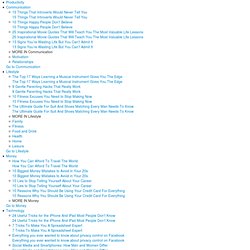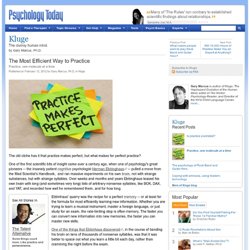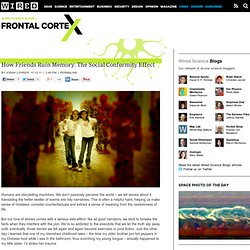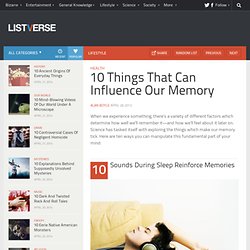

Reminiscence bump explanations: Why we remember young adulthood better than any other age. YanLev/iStockphoto/Thinkstock.

Twentysomethings are having a moment. They’re inspiring self-help guides (see Meg Jay’s The Defining Decade: Why Your Twenties Matter—And How To Make the Most of Them Now), hit television shows, Tumblrs-turned-handbooks, and lyrical New Yorker think pieces. What is it about twentysomethings? Robin Henig asked in the New York Times Magazine not too long ago. In part, she was talking about the current crop of young adults. This is Scary: Scientists find a way to erase frightening memories. Memory in the Brain [Interactive] Although most people think of memory as a vault for storing information, it is more like a seamstress who stitches together logical threads into scenes that make sense.
![Memory in the Brain [Interactive]](http://cdn.pearltrees.com/s/pic/th/memory-the-brain-interactive-82305932)
In this view, a good memory is therefore not one that holds lots of data but that can deftly separate what is useful from what could distract or upset you. Getting rid of what is not necessary—forgetting—is thus an important part of memory and of thought. It is also critical to emotional wellbeing. Revisiting bad memories is hardly a formula for happiness, after all. (For more on memory and forgetting, see Scientific American Mind’s special report on memory in January/February 2012.) To learn more about memory and the power of forgetting, see the January 2012 Scientific American Mind.
More to Explore8 Ways To Forget Your TroublesLet It GoA Feeling for the PastTrying to ForgetTotaling Recall10 Novels That Will Sharpen Your Mind [Interactive] How To Boost Brain Power and Memory. Until just a few years ago, doctors believed that the brain stopped making new neural connections - meaning that the memory began to get irreversibly worse - when the body stopped developing, usually in the early 20s.

And doctors knew that, like any other part of the body, neurons weaken as people age. Loss of brain function due to neural breakdown was assumed to be a normal, unavoidable part of aging. It turns out they were wrong. In the past few years, it has become clear that you can, in fact, make new neurons starting in your 20s and continuing well into old age. You can literally rewire the brain with new parts as the older parts wear out. How to Study Less by Learning Things Once. You read over your notes.

Then you read them over again. Then you read them over a third time. Then you take the test and are surprised at just how much you missed. Despite reading everything three times! A lot of study time is wasted because of one problem: you fail to learn things the first time around. Five Reasons That Memory Matters. The Most Efficient Way to Practice. The old cliche has it that practice makes perfect, but what makes for perfect practice?

Brain Aging Linked to Sleep-Related Memory Decline. To make memories, new neurons must erase older ones. Short-term memory may depend in a surprising way on the ability of newly formed neurons to erase older connections.

That's the conclusion of a report in the November 13th issue of the journal Cell, a Cell Press publication, that provides some of the first evidence in mice and rats that new neurons sprouted in the hippocampus cause the decay of short-term fear memories in that brain region, without an overall memory loss. The researchers led by Kaoru Inokuchi of The University of Toyama in Japan say the discovery shows a more important role than many would have anticipated for the erasure of memories. They propose that the birth of new neurons promotes the gradual loss of memory traces from the hippocampus as those memories are transferred elsewhere in the brain for permanent storage.
How Friends Ruin Memory: The Social Conformity Effect. Humans are storytelling machines.

We don’t passively perceive the world – we tell stories about it, translating the helter-skelter of events into tidy narratives. This is often a helpful habit, helping us make sense of mistakes, consider counterfactuals and extract a sense of meaning from the randomness of life. But our love of stories comes with a serious side-effect: like all good narrators, we tend to forsake the facts when they interfere with the plot. 10 Things That Can Influence Our Memory. Health When we experience something, there’s a variety of different factors which determine how well we’ll remember it—and how we’ll feel about it later on.

Science has tasked itself with exploring the things which make our memory tick. Here are ten ways you can manipulate this fundamental part of your mind: Sounds During Sleep Reinforce Memories Scientists have found that memories associated with sound can be reinforced by playing those sounds softly to people while they sleep. In a similar study by the same researchers, participants were asked to remember random locations of images on a screen, each of which was associated with a sound.
The scientists involved believe that we use our sleep to process and consolidate our memories. The jury’s out on what practical use this might have—but it at least suggests that we may be able to influence what we remember, with the help of a carefully chosen sound track. Develop Perfect Memory With the Memory Palace Technique. The Memory Palace is one of the most powerful memory techniques I know.

It’s not only effective, but also fun to use — and not hard to learn at all. The Memory Palace has been used since ancient Rome, and is responsible for some quite incredible memory feats. Eight-time world memory champion Dominic O’Brien, for instance, was able to memorize 54 decks of cards in sequence (that’s 2808 cards), viewing each card only once. And there are countless other similar achievements attributed to people using the Memory Palace technique or variations of it. Even in fiction, there are several references to the technique.
14 Old-School Ways to Remember Stuff. Count to 20Here's a fun way for the kids to learn:One, Two, buckle my shoe, Three, Four, knock at the door, Five, Six, pick up sticks, Seven, Eight, lay them straight, Nine, Ten, a big fat hen, Eleven, Twelve, dig and delve, Thirteen, Fourteen, maids a-courting, Fifteen, Sixteen, maids in the kitchen, Nineteen, Twenty, my plate's empty.

<strong>Count to 20</strong><br />Here's a fun way for the kids to learn:<br />One, Two, buckle… Your Memories Need Their Sleep. Ann Whitman (212) 223-4040awhitman@dana.org The big test is tomorrow—should you stay up late and study, or cut short the cram session and get a good night’s sleep?
Most if not all students face this dilemma at some point in their lives. Until very recently, their choice might have seemed obvious: stay up and study, to commit as much information to memory as possible. How your "working memory" makes sense of the world (Peter Doolittle) Eidetic memory. Overview[edit] The ability to recall images in great detail for several minutes is found in early childhood (between 2% and 10% of that age group) and is unconnected with the person's intelligence level. Explore - The Lab - Australian Broadcasting Corporation's Gateway to Science.
Improve Your Memory by Speaking Your Mind’s Language. By learning the language your mind uses, you’ll be able to tap into your mind’s full potential and develop a remarkable memory. It’s easier than you think – and you’ll actually have fun doing it. Your Mind Thinks in Pictures Along its evolution, the brain has become amazingly effective in dealing with sensory data. La mémoire des bébés. Researchers show that memories reside in specific brain cells. Our fond or fearful memories — that first kiss or a bump in the night — leave memory traces that we may conjure up in the remembrance of things past, complete with time, place and all the sensations of the experience.
Neuroscientists call these traces memory engrams. But are engrams conceptual, or are they a physical network of neurons in the brain? Little-known growth factor enhances memory, prevents forgetting in rats. Weight Loss Improves Memory. John Gunstad, an associate professor in Kent State University’s Department of Psychology, and a team of researchers have discovered a link between weight loss and improved memory and concentration.
The study shows that bariatric surgery patients exhibited improved memory function 12 weeks after their operations. “The initial idea came from our clinical work,” Gunstad said. “I was working at Brown Medical School in Rhode Island at the time and had the chance to work with a large number of people who were looking to lose weight through either behavioral means or weight loss surgery.” How Our Brains Make Memories. Forgetting is part of remembering. How Memory Works: an Infographic. 4 Things Most People Get Wrong About Memory. Human memory has been shown again and again to be far from perfect.